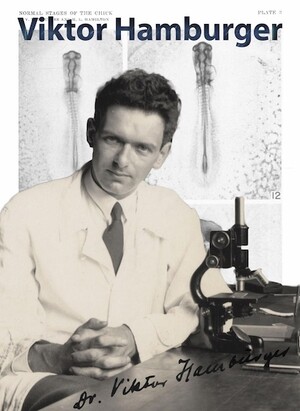Even before he closed his laboratory in the mid 1980s, Hamburger had already demonstrated both his interest in the history of his field and his considerable skill as a historian of science. No doubt this came from his German educational background, where an appreciation for history and philosophy was particularly widespread. Philosophy had taught him that it was important to know where a field of research had come from to help shape where it should be going. In a more specific biological context, Hamburger grew up with the influence of Ernst Haeckel (1834–1919), whose popular book, Die Welträtsel (The Riddle of the Universe), he claimed was one of the most influential books he had read. Haeckel’s insistence that the embryo’s history — its ontogeny and its phylogeny — were crucial to understanding its development, provided a major conceptual framework within which to pursue both embryological and historical work. At any rate, it was clear that for Hamburger, history mattered, and he contributed significantly to our deeper understanding of that history. Like everything else he did, his work in the history of biology and embryology was carefully executed, with meticulous attention to detail, careful analysis, and yet peppered with his own personal experiences and insights.
His first major published work on the history of embryology was an article he wrote in the year of his own retirement on the legacy of the Spemann school (Hamburger 1969). He followed this up with several articles focusing on the work of such figures as Santiago Ramon y Cajal (1852-1934), Wilhelm His (1831-1904), Ross Harrison (1870-1959), Hilde (Proeschelt) Mangold (1898-1924). He also undertook studies on the role of embryology in the evolutionary synthesis of the 1930s and 1940s. Among other topics he treated during his career included several historical accounts of the discovery of nerve growth factor.
The most masterful achievement of Hamburger’s historical work came with the publication of his highly acclaimed book, The Heritage of Experimental Embryology: Hans Spemann and the Organizer published by Oxford University Press (Hamburger 1988). This book provided a comprehensive history of Spemann’s work and the lab group which surrounded him in Freiburg. The Heritage of Experimental Embryology received rave reviews in both scientific and historical journals, and Hamburger continued contributing historical studies until the end of his life. His final historical work, written at the age of 99, was an introduction to and translation of a portion of Spemann’s autobiography, focused on deconstructing his mentor’s supposed vitalistic views to show that they were perfectly consistent with a materialist, though holistic anti-reductionist, philosophy, very much akin to Hamburger’s own (Hamburger 1999). His interests in the interrelationships between science, its history, and teaching accounts for the fact that he promoted the scholarly pursuit of the history of science within his own department by creating two faculty positions for biologist/historians, one in 1961 and another in 1966.
- Allen, Garland E. "A Pact with the Embryo: Viktor Hamburger, Holistic and Mechanistic Philosophy in the Development of Neuroembryology, 1927–1955." Journal of the History of Biology 37 (2004): 421–75.
- Cowan, W. Maxwell "Viktor Hamburger and Rita Levi-Montalcini: The Path to the Discovery of Nerve Growth Factor." Annual Review of Neuroscience 24 (2001): 551–600.
- Hamburger, Viktor. "The Journey of a Neuroembryologist." Annual Review of Neuroscience 12 (1989): 1–12.
- MBL History Project. (2016). Victor Hamburger Papers. https://hpsrepository.asu.edu/handle/10776/9/discover
- Maienschein, Jane. (2011). Maienschein: 100 Years Exploring Life. Charleston: Nabu Press.

